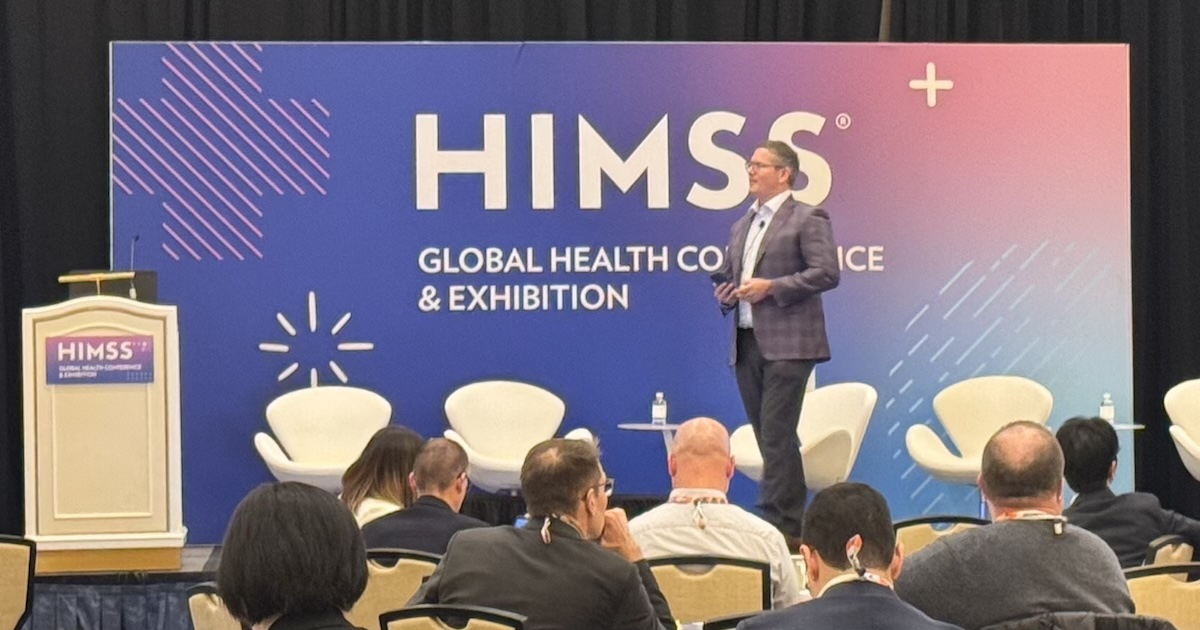
Matt Cybulsky, healthcare leader for AI, go-to-market and design at Ionian Consulting
Photo courtesy of MobiHealthNews
LAS VEGAS - At the Smart Health Transformation Forum during HIMSS25 here, Matt Cybulsky, healthcare leader for AI, go-to-market and design at Ionian Consulting, discussed forecasting and improving care using technology.
In his talk entitled, "Halcycon Days Ahead: A New Epoch of Forecasting and Improving Care," Cybulsky said that while AI has transformed how we interact, obtain information and what we think is authority, AI is not solving all healthcare's problems.
"There are wonderful plans about what it is going to do, what it's currently doing. But there is a reality to that," Cybulsky said. Still, it's important to think about ethics, integrity and privacy.
"We have to think about fighting AI with AI. CIOs are asking the question about AI including what we do with it, do we need it, is it going to replace labor, what's the relation of AI to labor?" he stated.
Cybulsky pointed out that AI industry experts are asking the questions: "When are we going to use it, when is it safe to deploy and what use cases of AI make sense?"
When it comes to healthcare, Cybulsky asserted that the demand for AI is real.
Due to a number of factors, fewer people are going into general practice residencies, and a lot of young students are not going into medicine, he said.
"We are heading to a place in 2026 where we have a 20% reduction in clinical availability for people to get the care they need. The country is getting older, we are getting better at diagnosing things, we have a lot of chronic conditions, and we have a lot of medical errors," Cybulsky said.
"We need to think about using these AI tools because of this demand imperative for rigorous outputs," he said. "It has to be better than humans. It has to have the scale and has to be reliable. The data that you have access to is still enormous. That's why there is a demand for AI."
If we combine claims with something like consumer behavior, he said, like transaction data from debit and credit cards, it offers a really interesting and precise forecasting model.
He cited an example of a firm that trained their database on CMS claims data, Medicare and Medicaid, which has a pretty rich data set. He said they also trained their algorithm on transaction data from debit and credit cards, along with some other data sites.
Because of this, they were able to make, with high precision, forecasted predictions on length of stay, revenue cost per inpatient and risk of inpatient admission after ED admission. They were also able to look at descriptive data, such as one's age, gender and ZIP code, and, in turn, make forecasts.
"That's the power of AI. We have to change the way we approach using these tools conceptually in order for us to win. There is a fundamental flaw in how we use AI in healthcare, and that is the idea of efficiency," Cybulsky said.
When it comes to healthcare, AI has largely been built on manufacturing, which Cybulsky pointed out does it fast and efficiently, all while making few errors.
But when it comes to the doctor and patient relationship, it is not just about efficiency but the emotional connection.
Cybulsky concluded by saying that the current momentum for AI could be curtailed by fear.
He noted that 80% of all data in healthcare is still left unstructured and, as a result, is not as accessible as it should be.
"If it's not unstructured, it's not inside of an AI algorithm. If it's not inside of an AI algorithm, we are not learning from it," Cybulsky said. "The future speculation of AI is real; I will not dispute that. But are we just getting started if 80% of our data is still in a place that we can't access?"




















